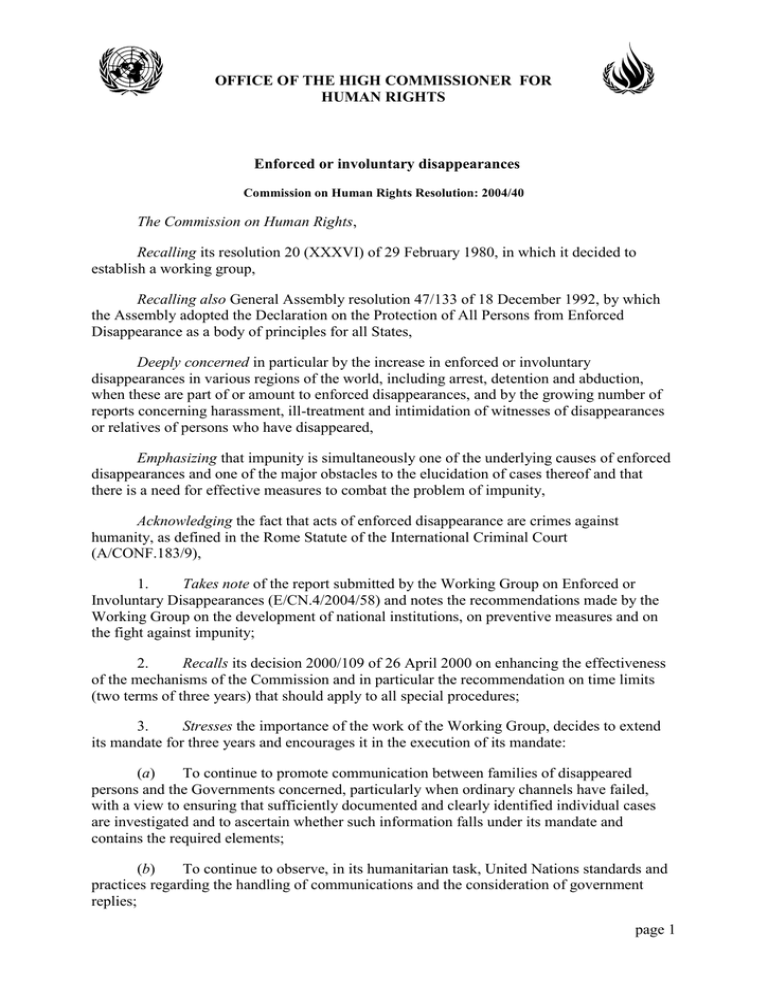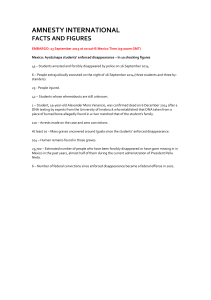establish a working group, OFFICE OF THE HIGH COMMISSIONER FOR
advertisement

OFFICE OF THE HIGH COMMISSIONER FOR HUMAN RIGHTS Enforced or involuntary disappearances Commission on Human Rights Resolution: 2004/40 The Commission on Human Rights, Recalling its resolution 20 (XXXVI) of 29 February 1980, in which it decided to establish a working group, Recalling also General Assembly resolution 47/133 of 18 December 1992, by which the Assembly adopted the Declaration on the Protection of All Persons from Enforced Disappearance as a body of principles for all States, Deeply concerned in particular by the increase in enforced or involuntary disappearances in various regions of the world, including arrest, detention and abduction, when these are part of or amount to enforced disappearances, and by the growing number of reports concerning harassment, ill-treatment and intimidation of witnesses of disappearances or relatives of persons who have disappeared, Emphasizing that impunity is simultaneously one of the underlying causes of enforced disappearances and one of the major obstacles to the elucidation of cases thereof and that there is a need for effective measures to combat the problem of impunity, Acknowledging the fact that acts of enforced disappearance are crimes against humanity, as defined in the Rome Statute of the International Criminal Court (A/CONF.183/9), 1. Takes note of the report submitted by the Working Group on Enforced or Involuntary Disappearances (E/CN.4/2004/58) and notes the recommendations made by the Working Group on the development of national institutions, on preventive measures and on the fight against impunity; 2. Recalls its decision 2000/109 of 26 April 2000 on enhancing the effectiveness of the mechanisms of the Commission and in particular the recommendation on time limits (two terms of three years) that should apply to all special procedures; 3. Stresses the importance of the work of the Working Group, decides to extend its mandate for three years and encourages it in the execution of its mandate: (a) To continue to promote communication between families of disappeared persons and the Governments concerned, particularly when ordinary channels have failed, with a view to ensuring that sufficiently documented and clearly identified individual cases are investigated and to ascertain whether such information falls under its mandate and contains the required elements; (b) To continue to observe, in its humanitarian task, United Nations standards and practices regarding the handling of communications and the consideration of government replies; page 1 (c) To continue to consider the question of impunity in the light of the relevant provisions of the Declaration on the Protection of All Persons from Enforced Disappearance and of the final reports submitted by the Special Rapporteur appointed by the Sub-Commission on the Promotion and Protection of Human Rights; (d) To continue to pay particular attention to cases of children subjected to enforced disappearance and children of disappeared persons and to cooperate closely with the Governments concerned in searching for and identifying these children; (e) To pay particular attention to cases transmitted to it that are most urgent from a humanitarian perspective and that refer to ill-treatment, serious threatening or intimidation of witnesses of enforced or involuntary disappearances or relatives of disappeared persons; (f) To pay particular attention to cases of disappearance of persons working for the promotion and protection of human rights and fundamental freedoms, wherever they occur, and to make appropriate recommendations for preventing such disappearances and improving the protection of such persons; (g) To continue to apply a gender perspective in its reporting process, including in information collection and the formulation of recommendations; (h) To provide appropriate assistance in the implementation by States of the Declaration and of the existing international rules; (i) To continue its deliberations on its working methods and to include these aspects in its report to the Commission at its sixty-first session; 4. Deplores the fact that some Governments have not provided for a long period of time substantive replies concerning the cases of enforced disappearances in their countries and have not given due consideration to relevant recommendations concerning this subject made in the reports of the Working Group; 5. Urges States: (a) To promote and give full effect to the Declaration on the Protection of All Persons against Enforced Disappearance; (b) To cooperate with the Working Group and help it to carry out its mandate effectively and, in that framework, give serious consideration to requests for visits to their countries; (c) To work to eradicate the culture of impunity for the perpetrators of enforced disappearances as a crucial step in effective prevention; 6. Urges the Governments concerned: (a) To intensify their cooperation with the Working Group on any action taken pursuant to recommendations addressed to them by the Working Group; (b) To take steps to protect witnesses of enforced or involuntary disappearances, human rights defenders acting against enforced disappearances, and the lawyers and families page 2 of disappeared persons against any intimidation or ill-treatment to which they might be subjected; (c) To continue their efforts to elucidate the fate of disappeared persons; (d) To make provision in their legal systems for machinery for victims of enforced or involuntary disappearances or their families to seek fair and adequate reparation; (e) To address the specific needs of the families of disappeared persons; 7. Reminds States: (a) That, as proclaimed in article 2 of the Declaration on the Protection of All Persons from Enforced Disappearance, no State shall practise, permit or tolerate enforced disappearances; (b) That all acts of enforced or involuntary disappearance are crimes punishable by appropriate penalties which should take due account of their extreme seriousness under penal law; (c) That they should ensure that their competent authorities proceed immediately to conduct impartial inquiries in all circumstances where there is reason to believe that an enforced disappearance has occurred in territory under their jurisdiction; (d) That, if such belief is borne out, all the perpetrators of enforced or involuntary disappearances must be prosecuted; (e) That impunity is simultaneously one of the underlying causes of enforced disappearance and one of the major obstacles to the elucidation of cases thereof; (f) That, as proclaimed in article 11 of the Declaration, all persons deprived of liberty must be released in a manner permitting reliable verification that they have actually been released and, further, have been released in conditions in which their physical integrity and ability fully to exercise their rights are assured; 8. Expresses: (a) Its thanks to the many Governments that have cooperated with the Working Group and replied to its requests for information and to the Governments that have accepted visits of the Working Group to their countries, asks them to give all necessary attention to the Working Group’s recommendations and invites them to inform the Working Group of any action they take on those recommendations; (b) Its appreciation to the Governments that are investigating, are cooperating at the international and the bilateral levels, have developed or are developing appropriate mechanisms to investigate any cases of enforced disappearance which are brought to their attention, and encourages all the Governments concerned to expand their efforts in this area; 9. Invites States to take legislative, administrative, legal and other steps, including when a state of emergency has been declared, to take action at the national and regional levels and in cooperation with the United Nations, if appropriate through technical assistance, and to provide the Working Group with concrete information on the measures taken and the page 3 obstacles encountered in preventing enforced or involuntary disappearances and in giving effect to the principles set forth in the Declaration; 10. Takes note of the assistance provided to the Working Group by non-governmental organizations and their activities in support of the implementation of the Declaration and invites those organizations to continue their cooperation; 11. Acknowledges with great concern the difficulties encountered by the Working Group in the accomplishment of its mandate and requests the Secretary-General: (a) To ensure that the Working Group receives all the assistance and resources it requires to perform its function, including supporting the principles of the Declaration, carrying out and following up on missions and holding sessions in countries that are prepared to receive it; (b) To provide the resources needed to update the database on cases of enforced disappearance; (c) To keep the Working Group and the Commission regularly informed of the steps taken for the wide dissemination and promotion of the Declaration; 12. Requests the Working Group to report on its activities to the Commission at its sixty-first session; 13. Takes note of the report of the intersessional open-ended working group to elaborate a draft legally binding normative instrument for the protection of all persons from enforced disappearance (E/CN.4/2004/59) and welcomes the substantial progress made during the second session of the intersessional working group and, in that context, welcomes the participation of non-governmental organizations; 14. Requests the intersessional working group to meet for a period of 15 working days in two formal sessions before the sixty-first session of the Commission, with one session of 10 working days and one session of five working days, the latter held from within existing resources, with a view to the prompt completion of its work, and to report to the Commission at its sixty-first session; 15. Requests the Chairperson-Rapporteur of the intersessional working group to undertake informal consultations with all interested parties in order to prepare the next session of the intersessional working group; 16. Requests the United Nations High Commissioner for Human Rights to invite the former independent expert to examine the existing international criminal and human rights framework for the protection of persons from enforced or involuntary disappearance, the former Chairman-Rapporteur of the sessional working group on the administration of justice of the Sub-Commission on the Promotion and Protection of Human Rights, who submitted to the sessional working group in 1998 a draft international convention on the protection of all persons from enforced disappearance (E/CN.4/Sub.2/1998/19, annex), and also a representative of the Working Group on Enforced or Involuntary Disappearances to participate in the activities of the intersessional working group; 17. Decides to consider this matter at its sixty-first session under the same agenda item. page 4 18. Decides to recommend to the Economic and Social Council the following draft decision for adoption: [For the text, see chap. I, draft decision 16.] 55th meeting 19 April 2004 [Adopted without a vote. See chap. XI..- E/2004/23 – E/CN.4/2004/127] page 5

